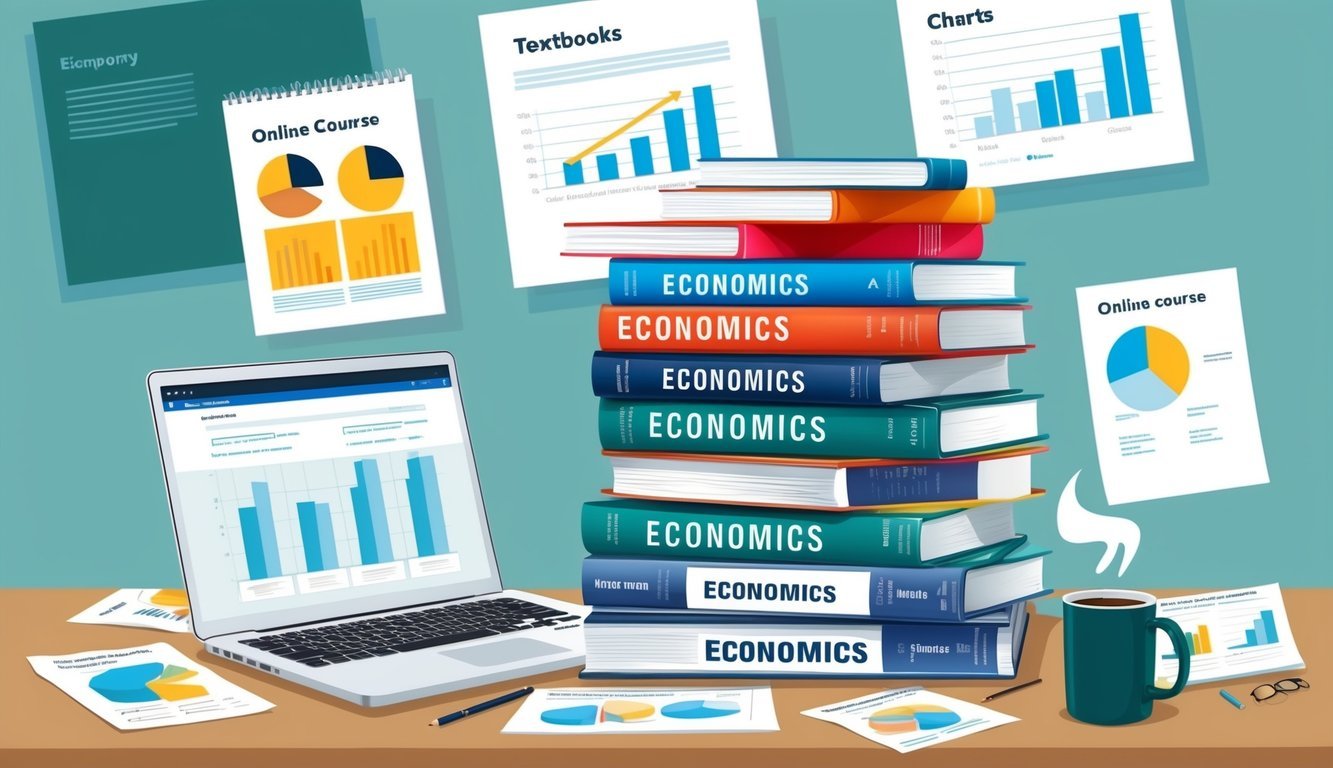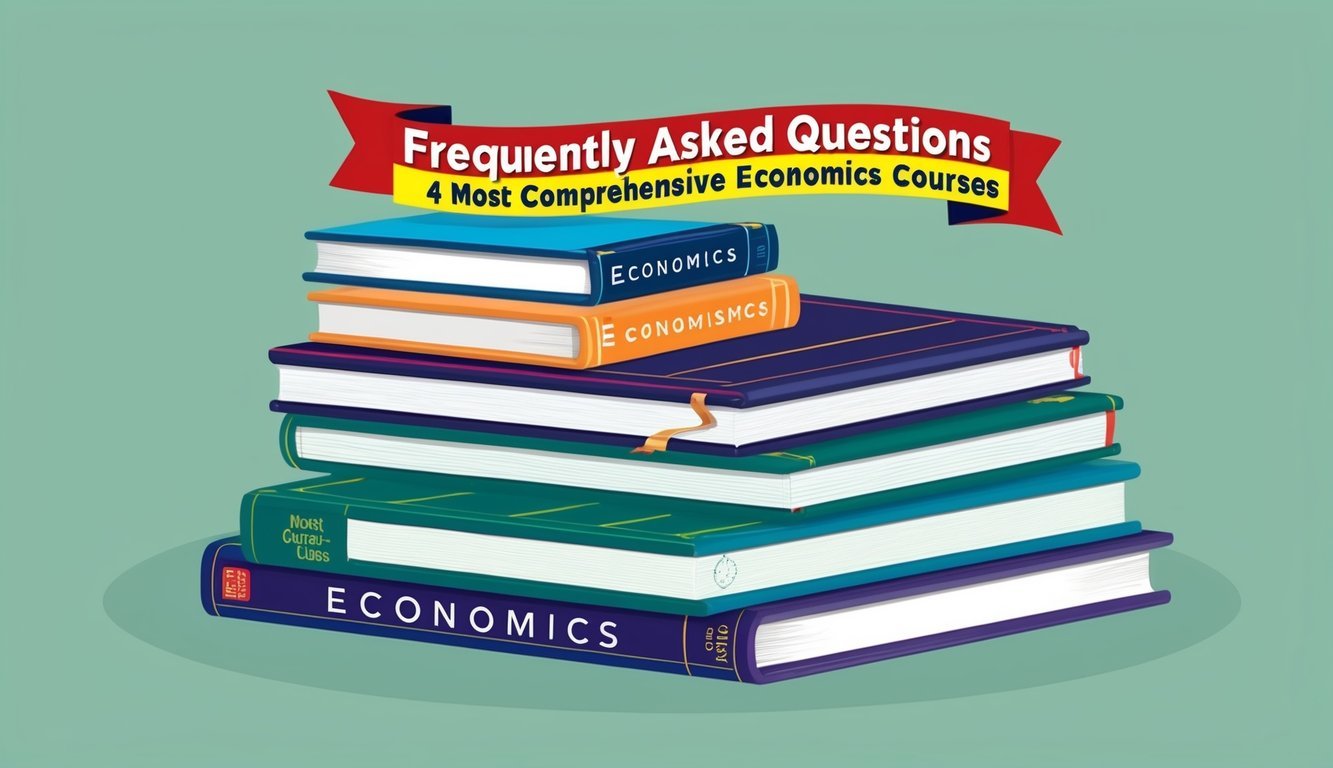Are you curious about economics? Taking an online course might just be your golden ticket to understanding this fascinating subject.
Seriously, there are loads of options out there, from breezy introductions to in-depth programs that could rival a college semester.

The best economics courses not only break down key concepts but also give you practical skills. You’ll get to grapple with topics like supply and demand, economic growth, and the ins and outs of money.
Some courses even throw in data analysis and math to help you study the economy.
Whether you’re looking to understand today’s headlines or kickstart a career in economics, these classes can be your launchpad.
1) MIT OpenCourseWare: Principles of Microeconomics

Want to get the lowdown on microeconomics from one of the world’s best? Check out MIT’s Principles of Microeconomics on OpenCourseWare.
It’s free, and yes, you heard that right!
This online gem covers all the essentials.
You’ll jump into supply and demand, market equilibrium, and consumer behavior.
There’s even insight into how firms behave and the different types of markets, like monopolies.
If some of those terms sound a little intimidating, don’t fret! The course serves everything up in bite-sized pieces.
You’ll find video lectures, problem sets, and exams to really put your knowledge to the test.
Plus, you’ll be learning directly from MIT professors.
They’ve got a knack for breaking down complex ideas into something that actually makes sense.
And since you can go at your own pace, there’s no pressure!
By the end, you’ll truly grasp how businesses and consumers make choices.
You’ll also pick up on welfare economics, public goods, and externalities.
These are the real-life concepts that impact our day-to-day lives.
Curious about market dynamics or why prices fluctuate? You’ll get a front-row seat to all that and more!
2) Coursera: Economics of Money and Banking by Columbia University
If you want to dive deep into the world of money and banking, take a peek at Economics of Money and Banking on Coursera.
Trust me, it’s worth checking out!
Taught by the folks at Columbia University, this course has been designed to give you a modern understanding of how money and banking have evolved over the years.
You’ll unpack the modern monetary system and get a handle on the 2007-2009 financial crisis—why it happened and what it means today.
With 13 modules to work through, you’ll dive into various aspects of money and banking, from basic principles to central bank operations.
The course offers a refreshing perspective on economic activity called the “money view.” It’s super handy when trying to make sense of our current economy.
Before you know it, you’ll have a solid understanding of how banks, money, and the economy are all interconnected.
Perfect for anyone wanting to boost their economics knowledge!
3) edX: The Economic Way of Thinking by the University of Queensland

Want to master thinking like an economist? Check out The Economic Way of Thinking on edX.
It’s being offered by the University of Queensland, known for its solid teaching and research.
This course gets into the basics of microeconomics and discusses big ideas like economic efficiency, scarcity, and opportunity costs.
These principles can help you understand how folks and businesses make choices in everyday life.
What’s great about this course? It ties economic concepts to real-world scenarios, helping you see how economics plays out in your daily decisions.
And don’t worry if you’re a newbie! It’s designed to be straightforward and engaging, making it easy to follow along.
When you wrap up, you’ll have a fresh set of lenses to view the world.
You’ll better understand how economics shapes everything from personal choices to major business strategies.
4) Harvard Online: Introduction to Game Theory
Ever wanted to understand game theory? Harvard’s Introduction to Game Theory course could be your ticket! Imagine picking the brain of top-notch instructors at a prestigious university!
This class covers the fundamentals of game theory.
You’ll explore different types of games and learn how to analyze them, including fun stuff like normal form, extensive form, and Bayesian games.
The best part? It’s not all just theory— you’ll see how game theory gets applied in real-world situations like economics, politics, and even in the tech world.
Don’t stress if you’re new to this—they start with the basics and build from there, with plenty of relatable examples to help you grasp the concepts.
After completing the course, you’ll be ready to use game theory to think about strategic interactions in a whole new light.
It’s fascinating how many areas of life it touches!
Understanding Economics Course Content

Economics courses usually cover a wide array of topics, including markets, money, and how economies work.
Let’s peek into what you can expect to study.
Core Concepts and Theories
In economics classes, you’ll tackle supply and demand, the twin pillars that explain how prices fluctuate.
You’ll also cover GDP and find out how it measures a nation’s wealth.
Inflation is another key player.
It’s the reason prices tend to rise over time.
You’ll get the scoop on why that happens and what it means for your paycheck.
Microeconomics dives into the choices we make as individuals and businesses.
You’ll figure out why some items cost more than others and learn about the various market types, including monopolies.
Emerging Trends in Economics
Economics is always evolving, and there’s plenty to keep your interest.
For instance, you might hear about behavioral economics, which blends psychology and financial decisions.
Then there’s green economics—a hot topic these days that examines how we can protect the environment while still making a profit.
Think carbon taxes and renewable energy markets.
Digital economics is also making waves.
You’ll learn the ins and outs of online markets, covering trends like cryptocurrency and the gig economy.
Don’t be surprised if data analysis becomes a big part of your learning.
Using stats to dissect economic trends is super valuable in today’s job landscape!
Why Comprehensive Economics Courses Matter

Taking deep-dive economics courses can honestly elevate your career and enhance your world view.
These classes provide practical skills and demonstrate how economics operates in the real world.
Skills Developed in Economics
Economics courses aren’t just about theories; they’ll teach you critical thinking and problem-solving skills.
You’ll become sharper at using numbers and analyzing data—abilities that are handy in many fields.
You’ll get better at spotting trends and making informed decisions based on information.
This skill comes in clutch whether you’re heading into business, finance, or the public sector.
Plus, economics helps you polish your communication skills.
You’ll practice turning complex concepts into simple explanations, which is beneficial in any career!
Real-World Applications
Economics isn’t just a bunch of textbook theories—it’s woven into the fabric of our daily lives. Studying economics helps you make sense of gas prices skyrocketing or how trade deals impact jobs.
You’ll also grasp how governments figure out taxes and spending—essential knowledge for anyone interested in policy or public service.
And let’s not forget personal finance! Through economics, you’ll learn strategies for saving, investing, and managing money.
These skills stick with you for life—helping you make savvy decisions about budgeting and spending.
If you want to secure your financial future, many of the best financial planning courses cover these topics in detail.
Who wouldn’t want to avoid debt and grow their savings?
In the business world, having an economics background equips you to make smarter choices.
You’ll be able to predict market trends and better understand consumer behavior.
Frequently Asked Questions

Economics courses come in all shapes and sizes.
Some are free, others come with certificates, and many cater to various educational levels.
Let’s tackle some common questions about finding the best economics courses.
What online courses offer the deepest understanding of economics for free?
If you want a no-cost option for in-depth learning, MIT OpenCourseWare’s Principles of Microeconomics is a top pick.
You’ll have access to lecture notes, problem sets, and exams—just like MIT students!
Another solid choice is Khan Academy’s Economics course, which breaks down both micro and macroeconomics in an easy-to-digest format.
Which universities in the USA provide the most extensive economics courses?
Harvard, MIT, and Stanford are usually at the top of the list for quality economics programs. Harvard’s Introduction to Economics offers a taste of their educational style without the hefty price tag.
The University of Chicago also has a comprehensive economics curriculum, known for its rigorous mathematical approach.
Can I find high-quality economics courses online that also offer certificates?
It’s a thorough dive into monetary economics and financial markets.
edX’s Microeconomics course from MIT also includes a verified certificate option to show off your achievements!
Where should high school students look for comprehensive economics courses online?
edX’s The Economic Way of Thinking by the University of Queensland is a fantastic resource for high school students.
It covers the basics in a way that’s super accessible.
The Foundation for Teaching Economics offers free online courses specifically designed for high school students, which is a big bonus!
In terms of content, what should I look for to find the best undergraduate course in economics?
Look for courses that cover both micro and macroeconomics thoroughly.
Important topics include supply and demand, inflation, market structures, and economic growth.
Courses that feature real-world applications and case studies are especially valuable.
For instance, Harvard’s Introduction to Game Theory demonstrates how economic concepts translate into actual situations.
What textbooks are considered the gold standard for comprehensive knowledge in economics?
For starters, “Principles of Economics” by Gregory Mankiw is a common favorite in introductory courses.
It clearly covers both micro and macro concepts.
If you’re up for a challenge, “Microeconomic Theory” by Mas-Colell, Whinston, and Green is a go-to for more advanced study—it’s dense but super comprehensive.

